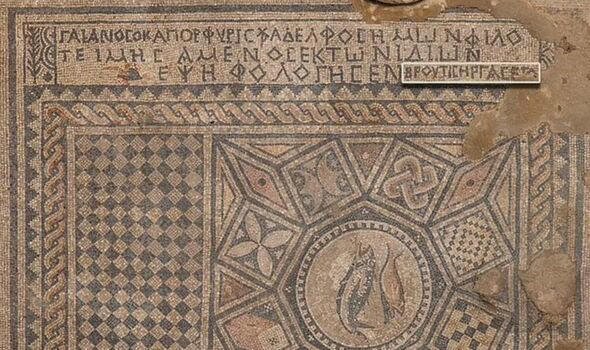The Mosaic That Challenges Christian History
An 1800-year-old mosaic unearthed in Israel’s Jezreel Valley has most definitely surprised the world of archaeology, history, and theology. Known as the Megiddo Mosaic, this artifact predates the Council of Nicea by nearly a century and proclaims “Jesus Christ” as “God.”
This find isn’t just an archaeological marvel; it forces a reevaluation of early Christian beliefs. If pagans, Samaritans, Jews, and Romans already venerated “Jesus” as “divine” in 230 AD, what does this mean for the commonly held narrative that his “divinity” was formalized at Nicea? Constantine, in 325 AD, may have needed a new and useful religion to unite his empire; he may have founded the religion called “Christianity” while also confirming the divinity of “Jesus”; but if that divinity, according to this newly discovered mosaic (230 AD), had already been established before Constantine’s “stamp of approval,” then the actual pagan origins and myth surrounding Jesus needs to be re-evaluated.
What Is the Megiddo Mosaic?
The Megiddo Mosaic is an intricately crafted artifact discovered beneath an ancient prison in Israel. It features geometric patterns, early Christian symbols like two fish, and Greek inscriptions. Most notably, one reads:
"The god-loving Akeptous has offered the table to God Jesus Christ as a memorial." (Espinal, 2024).
This inscription, dating to 230 AD, is the earliest physical evidence of “Jesus” being called "God." Alongside it are dedications to Roman contributors, such as an army officer, highlighting the mosaic’s diverse cultural roots.
Excavation leader Dr. Yotam Tepper, talking about this peculiar site in Israel, noted, “There was an early Christian community here way before Christianity became the official religion” (Sudilovsky, 2022). “Finds from the site area – including remains from a Roman period Jewish village having both Jewish and Samaritan residents, a Roman army legion camp and a Roman-Byzantine city – indicate the presence of diverse cultural, religious and ethnic population groups, he said” (Sudilovsky, 2022).
Why the Megiddo Mosaic Matters
Pre-Nicean Worship of Jesus as God: The mosaic predates the Council of Nicea (325 AD), where “Jesus' divinity” was codified into the Nicene Creed. This challenges the notion that institutional Christianity "invented" Jesus' godhood. Instead, it shows that early Christian communities—comprising Jews, Samaritans, and pagans—already revered the Jesus character as “divine.”
Involvement of Pagans and Women
The dedication from Akeptous highlights the significant role of women in early Christianity.
Contributions from Roman pagans suggest Jesus’ appeal transcended Jewish sectarianism, resonating with broader Roman, Samaritan, and pagan audiences.
Archaeological and Theological Significance: Museum of the Bible CEO Carlos Campo called it “the most significant archaeological find since the Dead Sea Scrolls.” As physical evidence, the mosaic bridges the gap between faith traditions and historical fact (Espinal, 2024).
The Council of Nicea: Settling the Question of Divinity
Fast forward to 325 AD, where the Council of Nicea gathered to address controversies about Jesus’ nature. The debates were fueled by Arianism, which argued that “Jesus” was a created being and subordinate to “God the Father.” If sticking to the Bible’s mythological system, where Israel’s “God” has no biological children but only creates his host, Arianism is actually the correct position to have, as “Jesus,” just like Michael and Gabriel, and all of the “host of heaven,” would have to also be a created figure. The Nicene Creed countered this by declaring Jesus homoousios—of the same substance as the Father (1st counsil) (Abogado, 2017).
While Nicea formalized the doctrine of Jesus’ divinity, the Megiddo Mosaic demonstrates that this belief was already established in grassroots Christian communities. The council’s outcomes, then, might reflect a unification of earlier, widespread theological ideas, rather than their invention.
Revisiting Christianity’s Narrative
The Megiddo Mosaic forces Christianity to reflect on its origins. If diverse groups long before the Council of Nicea venerated “Jesus” as “God,” the focus shifts from institutional dogma to the grassroots understanding of early believers, placing the Christian religion into a nuanced pagan religious category. This discovery challenges modern Christians to consider:
The Role of Early Christian Diversity: Early Christian communities were a blend of Jews, Romans, and pagans. Their theology developed organically, shaped by cultural and historical contexts.
The Universality of Jesus’ Message: The mosaic reveals Roman pagans were among those venerating Jesus as divine nearly a century before Nicea. The mosaic’s Roman contributors therefore suggest that “Jesus” resonated beyond Jewish boundaries. Christianity's appeal as a universal faith started far earlier than previously believed, and the movement may not have been called “Christianity.”
The Importance of Women in Early Christianity: Figures like Akeptous demonstrate that women were active participants and benefactors in shaping the early church.
A Rediscovered Beginning
The Megiddo Mosaic is more than an ancient relic—it is a call to revisit Christianity’s foundational narrative. It is a tangible link to early Christian worship practices, predating Christianity’s rise as the Roman Empire’s official religion, revealing an early church that was diverse, inclusive, and far ahead of its time in proclaiming the Jesus character as “divine.”
As this mosaic reminds us, history is not merely written by councils and creeds. This discovery suggests that belief in “Jesus’ divinity” was widespread and predates institutional decrees, pointing to a sure evolution of theology. The more we learn about the Christian religion, the more we are able to understand the spreading of a new and usable pagan deity within not simply the Roman Empire, but within Israel, where this mosaic was found.
Abogado, J. N. (2017). The Anti-Arian Theology of the Council of Nicea of 325. Angelicum, 94(2), 255-286.
Espinal, N. (2024). Israeli prison discovery reveals 1,800-year-old mosaic declaring Jesus as God. Daily Express US. https://www.the-express.com/news/us-news/155160/israeli-prison-1800-year-old-mosaic-Jesus-as-God
Sudilovsky, B. J. (2022). Early Christian mosaic to be 'released' from jail, Megiddo Prison move. The Jerusalem Post | JPost.com. https://www.jpost.com/archaeology/article-702887



